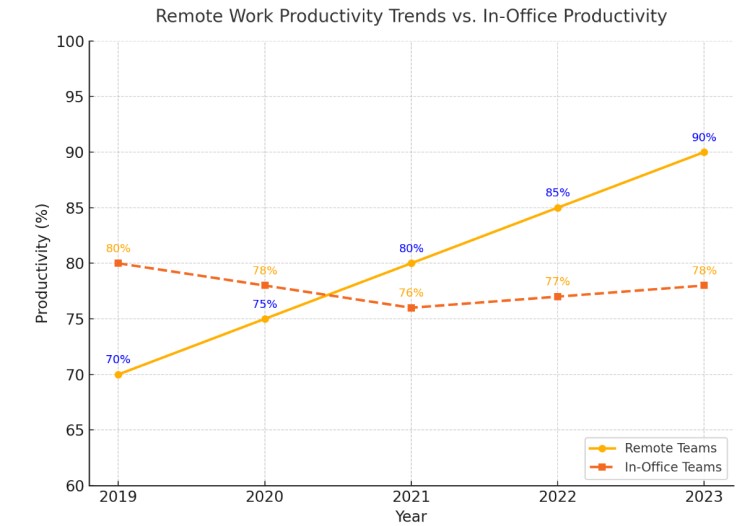
Creating a connected, productive team requires thoughtful planning and consistent support. Leveraging technology, fostering collaboration, and setting clear goals can keep your team on track. With the right approach, you can build trust, improve performance, and maintain a positive work culture remotely.
Adapting to remote work requires effort, but the rewards are significant. By prioritizing communication, flexibility, and inclusion, you can help your team succeed in a virtual environment.
Building Trust and Clear Communication in Remote Teams
Building trust and clear communication in remote teams is key to maintaining smooth collaboration. Without face-to-face interactions, it can feel harder to connect with your team. However, intentional strategies can foster trust and make communication seamless, even from a distance.
Start by creating a culture of transparency. Regularly share updates about projects, goals, and challenges to keep everyone aligned. Encouraging open communication allows your team to feel valued and informed. When you consistently prioritize clarity, team members can focus on their work without confusion or delays.
Using the right communication tools can also strengthen connections. Video calls can add a personal touch to team meetings and discussions. Messaging platforms and shared workspaces help streamline conversations and keep everyone on the same page. Combining these tools with a consistent communication schedule can create structure while giving your team flexibility.
Listening actively is another critical part of managing remote teams effectively. Acknowledge feedback and also act on it when possible to build trust within the team. When team members see their input valued, they feel more confident sharing ideas and concerns. This fosters a sense of collaboration that drives productivity.
Maintaining trust and communication requires ongoing effort. Clear expectations, open channels, and consistent engagement create a strong foundation for managing remote teams effectively. By focusing on these principles, you can build a connected and cohesive team, even in a virtual environment.
Setting Goals and Measuring Productivity in a Remote Environment
Setting goals and measuring productivity in a remote environment requires clarity and consistency. Clear objectives guide your team and keep everyone aligned. Without in-person oversight, well-defined goals help maintain focus and accountability.
Start by setting specific, measurable, and time-bound goals. Break larger objectives into smaller tasks so your team can track progress easily. When priorities are clear, your team knows what to focus on and how their work contributes to overall success. Regular check-ins can help keep projects on track without feeling intrusive.
Using tools like project management software allows you to monitor progress transparently. Visual timelines or task boards help team members see deadlines and dependencies. These tools also reduce the need for constant updates, fostering autonomy. Tracking progress effectively is a cornerstone of managing remote teams effectively while avoiding micromanagement.
Feedback and performance evaluation should focus on outcomes, not activity. Measure success based on results, rather than how long tasks take to complete. This approach reinforces trust and encourages your team to work efficiently. When team members feel trusted, they often perform better and stay more engaged.
Balancing oversight with flexibility is key to maintaining productivity. By setting clear expectations, providing resources, and evaluating results, you can guide your team without over-managing. This balance supports both individual performance and overall team success in a remote environment.
Leveraging Technology for Remote Team Collaboration
Leveraging technology is essential for remote team collaboration. The right tools help streamline communication, organize projects, and keep your team connected. By using technology effectively, you can overcome many challenges of managing remote teams effectively.
Virtual meeting platforms, such as Zoom or Microsoft Teams, make face-to-face communication easier. Regular video calls help your team stay aligned and build stronger relationships. These platforms also support screen sharing and real-time collaboration, which can improve productivity and clarity during discussions.
Project management tools like Trello, Asana, or Monday.com allow you to track progress and assign tasks efficiently. These tools provide a visual way to manage workflows and deadlines. With everyone able to see updates, your team stays informed without frequent check-ins.
Messaging platforms, such as Slack, keep communication quick and organized. Separate channels for topics or projects reduce clutter and make finding information easier. These tools also help create a sense of team connection, even when everyone is working from different locations.
Using the right technology enhances both productivity and collaboration. Combining communication, task management, and file-sharing tools can simplify your team’s workflow. By leveraging technology, you create a more connected and efficient remote work environment.
Establishing Boundaries and Promoting Work-Life Balance
Establishing boundaries and promoting work-life balance are essential for keeping your team healthy and productive in a remote setting. Without clear boundaries, work and personal life often overlap, leading to stress and burnout. By addressing these challenges, you can support your team while maintaining high performance.
Encourage your team to set specific working hours and stick to them. Defining when work starts and ends helps prevent overwork. Regularly remind team members to take breaks and disconnect after their workday. Promoting these habits can improve focus and energy during working hours.
Communication plays a big role in managing remote teams effectively while supporting balance. Set expectations for response times and avoid messaging outside regular hours unless necessary. Respecting your team’s personal time reinforces trust and reduces stress. This also helps establish a healthier work environment.
Providing resources for mental health and wellness can make a significant difference. Share information about stress management, physical activity, or mindfulness practices. Acknowledging the importance of self-care shows your team that their well-being matters. This can boost morale and strengthen engagement.
Promoting work-life balance requires consistent effort and attention. By setting boundaries, encouraging self-care, and respecting personal time, you help your team stay motivated and avoid burnout. This balance benefits both individual well-being and overall team performance.
Building Team Culture and Engagement Remotely
Building team culture and engagement remotely requires intentional effort and creativity. Without shared physical spaces, fostering camaraderie and inclusion takes a thoughtful approach. By prioritizing connection, you can maintain a strong team culture even in a virtual setting.
Regular virtual team-building activities help create a sense of belonging. Hosting casual coffee chats, trivia games, or themed events can break the monotony of work-focused meetings. These moments allow team members to connect on a personal level, which strengthens relationships and improves morale.
Celebrating achievements and milestones also plays a key role in managing remote teams effectively. Recognize individual and group successes through virtual shoutouts or small rewards. Acknowledging contributions helps everyone feel valued and motivates continued collaboration. This practice reinforces positive engagement within your team.
Creating inclusive spaces for communication is equally important. Encourage open discussions where all team members can share ideas or voice concerns. Using anonymous feedback tools can also help quieter team members feel heard. Prioritizing inclusion ensures everyone feels respected and engaged in team decisions.
Building a strong team culture remotely takes consistent effort. By fostering connection, celebrating successes, and creating inclusive communication spaces, you can keep your team motivated and unified. These strategies contribute to a positive work environment and improve collaboration across distances.
Addressing Challenges and Providing Support to Remote Employees
Remote work comes with unique challenges, such as isolation, communication gaps, and time zone differences. These obstacles can affect your team’s productivity and morale. Addressing these issues with thoughtful strategies can help you in managing remote teams effectively.
Isolation is a common concern for remote employees. Without regular in-person interactions, your team members may feel disconnected. To combat this, encourage regular video meetings and informal check-ins. Creating opportunities for casual conversations helps build relationships and fosters a sense of belonging.
Time zone differences can complicate collaboration. Scheduling overlapping hours for team discussions allows everyone to contribute. Providing flexibility in deadlines can also help accommodate different working hours. These adjustments show your team that you respect their time and value their contributions.
Providing meaningful support means understanding individual needs. Regularly check in with employees to discuss their challenges and offer assistance. Access to resources, such as mental health programs or professional development opportunities, can also improve their experience. When your team feels supported, they are more engaged and productive.
By addressing remote work challenges and offering targeted support, you create a more effective and cohesive team. Taking proactive steps helps maintain trust and ensures smoother collaboration across all aspects of your remote workforce.
Conclusion
Managing remote teams effectively requires thoughtful strategies and consistent effort. By addressing challenges and fostering connection, you can support your team’s success. Clear communication, trust, and flexibility are key to maintaining productivity and engagement. Leveraging the right tools and promoting work-life balance helps your team stay focused and motivated.
Remote work environments can be challenging, but proactive management makes a difference. Providing resources and listening to employee needs builds trust and loyalty. When your team feels valued, they are more likely to perform at their best.
Staying adaptable as well as prioritizing collaboration ensures long-term success. By creating a supportive and organized framework, you can navigate remote work challenges while keeping your team unified.



